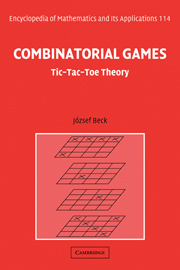Book contents
- Frontmatter
- Contents
- Preface
- A summary of the book in a nutshell
- PART A WEAK WIN AND STRONG DRAW
- PART B BASIC POTENTIAL TECHNIQUE – GAME-THEORETIC FIRST AND SECOND MOMENTS
- PART C ADVANCED WEAK WIN – GAME-THEORETIC HIGHER MOMENT
- PART D ADVANCED STRONG DRAW – GAME-THEORETIC INDEPENDENCE
- Appendix A Ramsey Numbers
- Appendix B Hales–Jewett Theorem: Shelah's proof
- Appendix C A formal treatment of Positional Games
- Appendix D An informal introduction to game theory
- Complete list of the Open Problems
- What kinds of games? A dictionary
- Dictionary of the phrases and concepts
- References
PART A - WEAK WIN AND STRONG DRAW
Published online by Cambridge University Press: 06 July 2010
- Frontmatter
- Contents
- Preface
- A summary of the book in a nutshell
- PART A WEAK WIN AND STRONG DRAW
- PART B BASIC POTENTIAL TECHNIQUE – GAME-THEORETIC FIRST AND SECOND MOMENTS
- PART C ADVANCED WEAK WIN – GAME-THEORETIC HIGHER MOMENT
- PART D ADVANCED STRONG DRAW – GAME-THEORETIC INDEPENDENCE
- Appendix A Ramsey Numbers
- Appendix B Hales–Jewett Theorem: Shelah's proof
- Appendix C A formal treatment of Positional Games
- Appendix D An informal introduction to game theory
- Complete list of the Open Problems
- What kinds of games? A dictionary
- Dictionary of the phrases and concepts
- References
Summary
Games belong to the oldest experiences of mankind, well before the appearance of any kind of serious mathematics. (“Serious mathematics” is in fact very young: Euclid's Elements is less than three-thousand years old.) The playing of games has long been a natural instinct of all humans, and is why the solving of games is a natural instinct of mathematicians. Recreational mathematics is a vast collection of all kinds of clever observations (“pre-theorems”) about games and puzzles, the perfect empirical background for a mathematical theory. It is well-known that games of chance played an absolutely crucial role in the early development of Probability Theory. Similarly, Graph Theory grew out of puzzles (i.e. 1-player games) such as the famous Königsberg bridge problem, solved by Euler (“Euler trail”), or Hamilton's roundtrip puzzle on the graph of the dodecahedron (“Hamilton cycle problem”). Unlike these two very successful theories, we still do not have a really satisfying quantitative theory of games of pure skill with complete information, or as they are usually called nowadays: Combinatorial Games. Using technical terms, Combinatorial Games are 2-player zero-sum games, mostly finite, with complete information and no chance moves, and the payoff function has three values ±1, 0 as the first player wins or loses the play, or it ends in a draw.
- Type
- Chapter
- Information
- Combinatorial GamesTic-Tac-Toe Theory, pp. 15 - 16Publisher: Cambridge University PressPrint publication year: 2008



